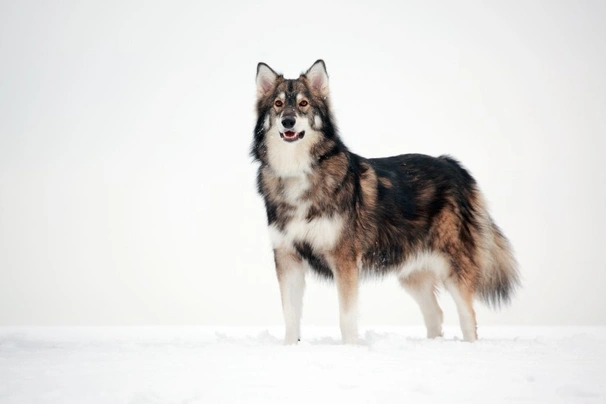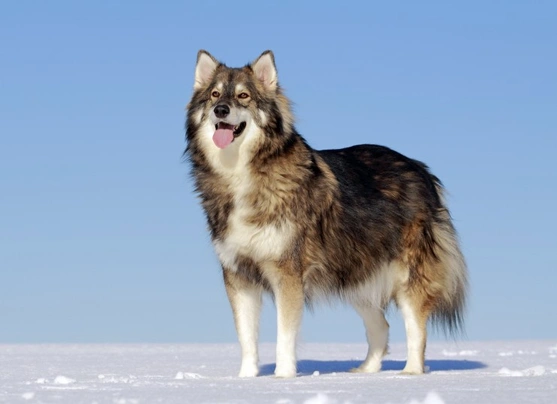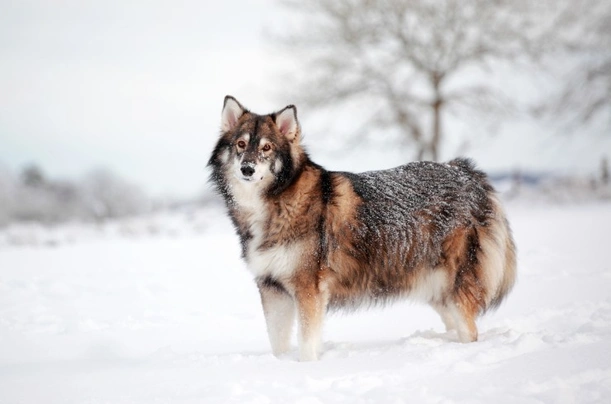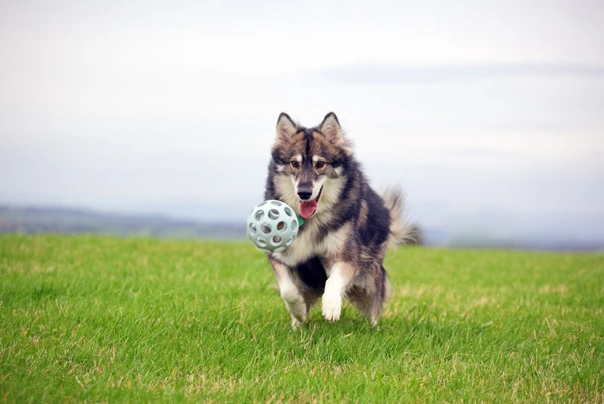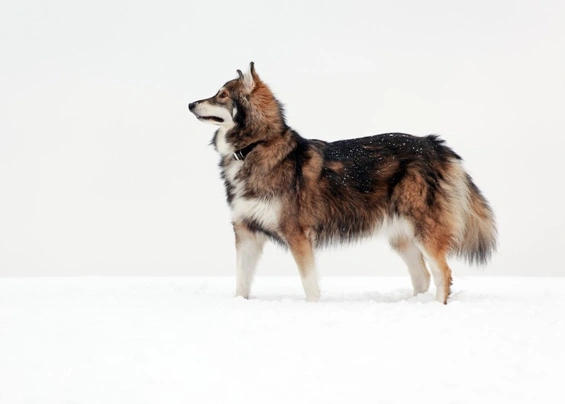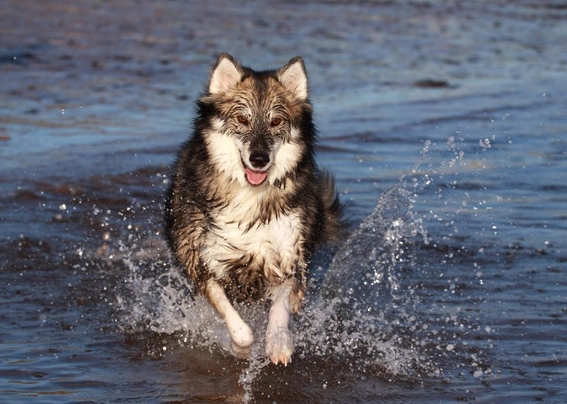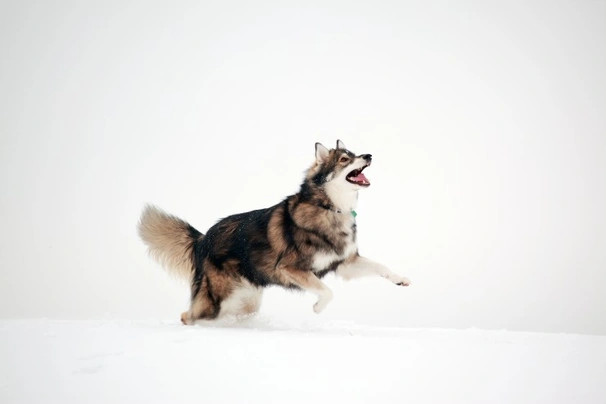Utonagan
Pros
Cons
Introduction of the Utonagan
The Utonagan, named after the Chinook Indian phrase meaning "spirit of the wolf," is a striking breed designed to emulate the appearance of a wolf while retaining the gentle temperament of a domestic dog. Introduced into the UK in the late 1980s, this rare breed is gaining gradual recognition for its unique blend of intelligence, adaptability, and striking wolf-like appearance without any actual wolf DNA. It has become well-known for its role as a PAT therapy dog in schools, hospitals, and hospices, demonstrating both its versatility and gentle nature.
Originally bred from the Alaskan Malamute, Siberian Husky, and German Shepherd, the Utonagan combines a muscular yet athletic build with a calm, friendly demeanour. Their temperamental balance makes them wonderful family pets for owners with an active outdoor lifestyle who understand the needs of this intelligent breed. They are highly trainable but require socialisation and handling by experienced owners due to their specific behavioural traits and exercise demands.
The ideal Utonagan owner will be someone familiar with active, high-energy breeds, who can provide consistent training, ample daily exercise, and plenty of mental stimulation. Their wolf-like appearance may attract interest, but potential owners must appreciate that their behaviour is that of a domestic dog, not a wild animal. Therefore, training and early socialisation are key to nurturing their affectionate, obedient personality.
Care requirements are moderate to high, including regular grooming to manage their dense coat, especially in winter, and a structured exercise routine to keep them fit and content. With proper training and commitment, Utonagans thrive as affectionate companions and loyal family members, well suited to experienced owners who can meet their physical and mental needs.
Perfect For
Active families or individuals experienced with large, intelligent breeds who enjoy outdoor activities and canine sports. Utonagans excel in therapy work, making them ideal for owners interested in canine-assisted activities and who can provide consistent leadership.
Key Considerations
Requires expert socialisation and training from a young age due to their strong pack instincts and intelligence. Needs a secure garden with high fencing, daily vigorous exercise, and mental challenges to avoid boredom. Not suitable for first-time dog owners or those who cannot dedicate significant time to training and companionship.
History of the Utonagan
The Utonagan was developed with the intent to create a dog resembling a wolf in appearance, without any actual wolf ancestry. This distinctive breed originated in the UK during the late 1980s through crosses of three domestic breeds: the Alaskan Malamute, Siberian Husky, and German Shepherd. The initial stock came from five rescue dogs imported from America in 1987 whose exact origins are unknown.
Early Development
Breeders, including Edwina Harrison, aimed to cultivate a dog with the wolf-like look but a manageable domestic temperament. Harrison initially marketed them as "Wolf-Dogs" before renaming them Northern Inuits and later settling on the name Utonagan. The breeding programme focused on crossing the foundational breeds deliberately to achieve their unique aesthetic and personality. This development created a close affinity with the Northern Inuit breed, with which they share ancestry but have since diverged into distinct lines via selective breeding.
Modern Recognition
Despite continued interest and the formation of multiple breed clubs—such as The Utonagan Association, The Utonagan Club, and The British Utonagan Association—the breed remains unrecognised by The Kennel Club as of January 2018. Differences in breeding philosophies caused fractures within breed clubs, leading to the emergence of separate Utonagan lines, including "British Utonagans." These developments have contributed to the breed's status as a rare and specialist type. Today, the Utonagan's growing popularity is tied to its roles in therapy work and as a devoted family companion, despite limited availability of well-bred puppies within the UK.
Appearance of the Utonagan
Size and Build
The Utonagan is a large breed with males standing between 63 and 84 cm at the withers and weighing 32 to 50 kg, while females are slightly smaller, measuring 61 to 71 cm and weighing 25 to 41 kg. They possess a muscular yet athletic and agile build, well-balanced to reflect their speed and power despite their lighter frame compared to other large breeds.
Coat and Colours
This breed features a dense, close, and straight double coat that thickens significantly during winter months due to a profuse undercoat, especially covering the body and inside the ears. The coat becomes noticeably lighter in summer, offering natural temperature regulation. Accepted colours include grey, black, tan, and buff, all accompanied by a darker, clearly defined mask on the face. Utonagans with coloured coats typically have a distinct black tip on their bushy tails.
Distinctive Features
Their head is proportional but never broad, with a slightly defined stop and a longer muzzle relative to the skull length. Eyes are almond-shaped, ranging from dark brown to light amber, with yellow being the preferred colour. Their ears are widely spaced with slightly rounded tips, while their strong jaws exhibit a perfect scissor bite. The dog's neck is long, strong, and well-muscled, often adorned with a mane-like ruff. Their narrow chests and well-muscled loins contribute to a graceful, level topline and powerful hindquarters, with webbed oval feet supporting their agility. A Utonagan's gait is marked by long, effortless strides and strong hindquarter drive, conveying both power and elegance.
Gender Differences
Males are typically taller and heavier, with a more robust neck and more pronounced mane. Females tend to be slightly more compact but retain similar strength and agility. Behaviourally, females can be somewhat less dominant, although both genders require firm, patient leadership to channel their natural instincts positively. In the show ring, preference is given to dogs that embody a strong wolf-like outline paired with sound structure and movement.
Breed Club and Show Standards
As a breed not recognised by the Kennel Club, Utonagans rely on breed clubs to maintain breeding standards focusing on health, temperament, and their wolf-like appearance. Faults including white coats, blue eyes, curly tails, and poorly formed jaws are discouraged to preserve breed integrity.
Temperament of the Utonagan
Core Personality Traits
The Utonagan boasts a well-balanced, intelligent, and friendly temperament. They are deeply social creatures, thriving on close bonds with their human families and exhibiting a gentle nature ideal for households including children when socialised properly. Their inherent loyalty and strong pack instincts drive a need to understand hierarchy, responding best to firm, fair, and consistent leadership.
Social Behavior
Whilst generally affectionate, Utonagans can be boisterous when young and display a high prey drive necessitating careful control around small animals and wildlife. They enjoy the company of other dogs and often prefer living alongside canine companions, fitting their pack-oriented mindsets. Their manner towards strangers tends towards cautious alertness rather than aggression, making them unsuitable as traditional watchdogs but effective alert dogs.
Working Instincts
The breed's intelligence and adaptability make them ideal candidates for work such as therapy and agility sports. They thrive on mental challenges and physical activity, quickly mastering commands and tasks but demanding engagement to prevent boredom-induced behaviour issues.
Common Behavioral Challenges
Due to their strong attachment to family, Utonagans often suffer from separation anxiety if left alone for long periods, which may lead to destructive behaviours or excessive barking. Their high energy levels require regular constructive outlet, and their strong prey drive necessitates cautious off-lead exercise in secure areas. Early socialisation and consistent training are essential to harness their intelligence positively and avoid dominance issues or behavioural problems.
Intelligence / Trainability of the Utonagan
The Utonagan's intelligence and quick learning abilities make them an engaging yet demanding breed to train. Early socialisation and training are crucial to ensuring they mature into well-adjusted adults. Training should begin during puppyhood and be consistent, fair, and positive to foster understanding and cooperation.
Puppy Training Priorities
During the first six months, priority should be placed on socialisation with people, animals, and diverse environments, alongside basic obedience commands such as sit, stay, come, heel, quiet, leave it, down, and place/bed. Establishing clear rules and boundaries early prevents dominance behaviours, reinforcing the owner's leadership position firmly yet gently.
Training Methods That Work
Due to their sensitivity, harsh corrections are counterproductive; positive reinforcement methods such as treats, praise, and interactive play yield the best results. Training sessions should be kept short and varied, as the Utonagan can quickly become bored. Firm but gentle handling encourages obedience without fear, making learning an enjoyable process.
Advanced Training Potential
Utonagans excel in canine sports like agility, flyball, obedience, and tracking thanks to their physical agility and strong noses. Given their history as therapy dogs, they also adapt well to service and assistance roles requiring cooperation and calm demeanour.
Common Training Mistakes
Owners often err by using inconsistent commands or harsh discipline, resulting in confusion or fearfulness. Overindulgence of puppies can create difficulty establishing authority later. Neglecting mental stimulation and exercise can lead to behavioural problems such as destructiveness or excessive vocalisation. Consistency, patience, and positive engagement are essential for success.
Children and other
Age-Specific Interactions
The Utonagan is generally gentle and patient with children but its substantial size and high energy can pose risks during unsupervised interactions, especially with toddlers or very young children. Close adult supervision during playtime is essential to prevent accidental knocks or injuries. Older children and teenagers often enjoy a dynamic and affectionate playmate in the Utonagan, who thrives on active engagement.
Teaching Children Proper Interaction
Children should be taught to respect the Utonagan’s space, avoid sudden movements, and understand canine body language to foster safe interactions. Teaching consistent commands to children enables them to participate in training and bonding activities positively, helping the dog recognise family routines.
Breed-Specific Considerations
Given the breed’s size and boisterous nature, care must be taken when introducing Utonagans to families with small pets, as their high prey drive could trigger chasing behaviour. Families should ensure a secure environment that accommodates the dog’s exercise needs without risk to children or smaller animals.
Creating Safe Environments
Safe spaces where the Utonagan can retreat when overwhelmed or tired are important, along with ongoing supervision during interactions with children. Teaching children to approach calmly and speak softly around the dog helps create a harmonious household dynamic.
Health of the Utonagan
Breed-Specific Health Conditions
The Utonagan is a relatively new and unrecognised breed, so comprehensive breed-specific health data is limited. However, due to its foundation breeds—the Alaskan Malamute, Siberian Husky, and German Shepherd—the Utonagan is predisposed to certain hereditary conditions including hip and elbow dysplasia, Addison's disease, epilepsy, von Willebrand's disease, and various heart and renal issues. Cataracts and other eye conditions are also noted.
Genetic Testing Requirements
Responsible breeding programs involve hip scoring (with an average hip score target of 18), elbow dysplasia testing, and eye examinations to reduce incidence of hereditary problems. Only dogs free of hereditary eye diseases and with good hip and elbow scores should be selected for breeding to maintain breed health.
Preventive Healthcare Schedule
Vaccination protocols generally begin at 10-12 weeks, with follow-ups for boosters and annual health checks recommended. Spaying and neutering practices vary but are commonly advised between 6 and 12 months of age to balance maturity and health needs. Regular parasite prevention and allergy monitoring are prudent due to general susceptibility to environmental allergens.
Insurance Considerations
The Utonagan's predisposition to some moderate health issues suggests pet insurance is advisable, with premiums varying by location, age, and coverage level. Consulting insurers for lifetime policies is beneficial for managing potential veterinary costs associated with hereditary diseases or injuries.
Caring for the Utonagan
Daily Care Routine
Caring for a Utonagan involves a commitment to a consistent routine combining regular exercise, grooming, nutrition, and social interaction. Puppy care demands safe, puppy-proofed environments with close supervision and plenty of calming rest periods alongside bursts of active play. Adults require scheduled walks, daily mental stimulation, and socialisation opportunities.
Living Environment Needs
Utonagans do best in homes with secure, spacious gardens equipped with high fencing to contain their athleticism and prevent escape. Although adaptable to indoor living, they require sufficient space and access to outdoor activity for their physical and mental well-being. Climate-wise, their dense coats suit cooler conditions, warranting special heat management during summer months.
Seasonal Care Adjustments
Winter necessitates more intensive grooming and monitoring for skin health due to their thick undercoat, while summer care focuses on avoiding overheating through exercise during cooler times of day and ensuring access to shade and fresh water. Ear checks are critical year-round to prevent infections from wax buildup.
Senior Care Adaptations
As Utonagans age, diet adjustments for lower calorie, highly digestible food become crucial to manage weight and maintain health. Exercise routines should be adapted to reduced stamina, with arthritis management and comfortable bedding supporting mobility. Routine vet visits for health monitoring and dental care are important to maintain quality of life in senior years.
Grooming of the Utonagan
Coat Maintenance Schedule
Throughout the year, the Utonagan requires regular grooming to maintain coat health and comfort. Twice weekly brushing suffices in summer to remove dead hair and reduce shedding. In winter, daily grooming is often necessary due to the development of a thick undercoat, requiring thorough attention to prevent mats and tangles.
Professional Grooming Requirements
Periodic visits to a professional groomer may be beneficial during winter months to manage the undercoat and maintain a healthy skin barrier. Grooming costs can vary but budgeting for 4 to 6 visits annually is prudent for optimal care.
Home Grooming Techniques
Owners should equip themselves with slicker brushes, grooming gloves, and deshedding tools to manage the coat at home. Regular ear checks and cleaning prevent infections, while nail trimming and dental care round out the home grooming routine.
Common Grooming Challenges
Challenges can include managing seasonal shedding peaks, preventing ear infections due to moisture retention in dense fur, and ensuring mats do not develop especially around the neck ruff and tail. Regular maintenance and prompt attention to skin or coat issues help minimise these concerns.
Exercise of the Utonagan
Daily Exercise Requirements
The Utonagan is a dog of high energy requiring a minimum of 60 minutes of vigorous exercise per day, ideally split between at least two sessions. These sessions should combine long walks with opportunities for secure off-lead exploration to satisfy their instinctive roaming drive and physical needs.
Suitable Activities
Activities such as agility, flyball, obedience training, tracking, and interactive games are excellent outlets for their physical and mental energies. Swimming is often enjoyed, particularly during warmer weather, but off-lead activity must always be conducted in secure, enclosed spaces due to their strong prey drive.
Exercise Restrictions
Young puppies must not be over-exercised to safeguard developing joints and bones; activities involving jumping or stair climbing should be minimised until fully mature. Weather considerations, particularly heat, require exercise during cooler times of day to prevent overheating.
Mental Stimulation Ideas
Providing puzzle toys, scent games, obedience challenges, and varied training sessions are crucial for preventing boredom. A weekly exercise plan balancing physical activity with enrichment supports their well-being and reduces behavioural issues.
Feeding of the Utonagan
Nutritional Requirements
Utonagan puppies require a high-protein, balanced diet formulated to support growth, with protein levels recommended between 14-21% and fat content below 10%. Adult dogs benefit from high-quality adult diets tailored to their activity levels and metabolic needs.
Feeding Schedule Guidelines
Feeding should be distributed evenly with puppies receiving 3-4 meals daily, gradually transitioning to twice daily meals for adults. Portion sizes vary from approximately 286g to 579g daily for puppies depending on age, and 332g to 521g for adults based on weight and activity.
Special Dietary Considerations
Owners should be mindful of potential food sensitivities, avoiding diets high in cereals or grain fillers. Supplements may be warranted for joint health or coat condition but should always be discussed with a vet.
Weight Management
Maintaining an ideal body condition is critical to prevent obesity-related health issues. Regular weight monitoring and adjustment of food intake alongside exercise help manage healthy body composition throughout life stages.
Utonagan price
Purchase Prices
Utonagan puppies are relatively rare in the UK, typically commanding prices between 400 and 800 from individual breeders due to limited availability and the breed's niche status. Buyers should anticipate waiting periods for healthy, well-bred puppies, and prices can vary based on lineage and breeder reputation.
Initial Setup Costs
New owners should budget for essential supplies, including a sturdy collar or harness, leads, quality food and water bowls, grooming tools such as brushes and nail clippers, a crate suitable for transportation and rest, plus safe puppy-proofing equipment like gates or playpens. Initial costs for these setup items typically range from {100} to {200}.
Ongoing Monthly Expenses
Expect to spend approximately {40} to {50} per month on premium dog food tailored to life stages. Routine vet visits, vaccinations, flea and worm treatments generally add several tens of pounds monthly when averaged annually, alongside grooming expenses that fluctuate seasonally, often around {20} to {40}. Insurance premiums vary based on coverage type and location.
Lifetime Cost Considerations
Health conditions typical of the Utonagan's parent breeds may necessitate periodic veterinary care, influencing lifetime costs. Insurance policies averaging {20} to {50} monthly are advisable to mitigate potential health-related expenses. Professional grooming, training classes, and dietary supplements are additional factors impacting long-term budgets.
To explore available Utonagan puppies for sale, please visit find Utonagan for sale on Pets4Homes.
Buying advice
When looking to purchase a Utonagan puppy, prospective owners must exercise caution due to the breed's niche status and limited availability. It is essential to register interest with reputable breeders and be prepared for wait times. Avoid online scams and never purchase a puppy without a physical visit to the breeder's home to verify authenticity and conditions.
The Utonagan's popularity has attracted unscrupulous breeders, so buyers should seek breeders who follow ethical practices, limiting dam litters appropriately and providing full health documentation. Essential health tests include hip scoring, elbow testing, and eye exams, with certification and record verification highly recommended. Detailed lineage and vaccination history should be provided.
Puppy selection involves observation of temperament, health, and interaction with littermates and humans to ensure confidence and sociability. The contract should include guarantees for health and spay/neuter guidelines, with clear return policies in place.
Additionally, considering Utonagan rescues may provide opportunities to adopt a dog needing a loving home. Rescue groups specializing in the breed or related breeds such as the German Shepherd, Siberian Husky, and Northern Inuit may offer prospects.
To view current availability, visit find Utonagan for sale.
